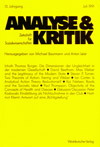Liberalismus

1992 (14) Issue 1
Editorial
Wenn es für westliche Gesellschaften nach dem Zusammenbruch politischer Utopien und sozialer Heilslehren noch ein vereinigendes Selbstverständnis gibt, dann dasjenige des Liberalismus. Gemäß der liberalen Doktrin der Eindämmung politischer Macht zugunsten individueller Freiheit sollen wirksam garantierte Bürgerrechte kulturelle und weltanschauliche Differenzen dem privaten Lebensbereich überantworten und so politisch neutralisieren. Die Trennung privater und öffentlicher Sphären erschei...
Table of Contents
Title: Liberal Justification and the Limits of Neutrality
Author: Arthur Ripstein
Page: 3-18
Abstract: This paper examines a style of political justification prominent in contemporary liberalism, according to which policies are legitimate only if they can be shown to be acceptable to all. Although this approach is often associated with neutrality about the good life, it is argued that liberalism cannot be neutral about questions of the role of various goods, such as work, play and community. The paper closes by exploring the implications and applicability of this account of justification to contemporary political practice.
Title: Constructivism and Practical Reason in Rawls
Author: Kenneth Baynes
Page: 18-32
Reason must in all its undertakings subject itself to criticism; should it limit freedom of criticism by any prohibitions, it must harm itself, drawing upon itself a damaging suspicion ... Reason depends on this freedom for its very existence. For reason has no dictatorial authority; its verdict is always simply the agreement of free citizens, of whom each one must be permitted to express, without let or hindrance, his objection or even his veto. I. Kant, Critique of Pure Reason (A738/B766)
Abstract: This essay argues that Rawls's recent constructivist approach waivers between a relativist defense and a more Kantian account which grounds his conception of justice in the idea of an agreement between free and equal moral persons. It is suggested that this ambiguity lies at the center of his attempt to provide a "political not metaphysical" account which is also not "political in the wrong way".
Title: Two Models of Pluralism and Tolerance
Author: Will Kymlicka
Page: 33-56
Abstract: In his most recent work, John Rawls argues that political theory must recognize and accomodate the 'fact of pluralism', including the fact of religious diversity. He believes that the liberal commitment to individual rights provides the only feasible model for accomodating religious pluralism. In this paper, I discuss a second form of tolerance, based on group rights rather than individual rights. Drawing on historical examples, I argue that this is also a feasable model for accomodating religious pluralism. While both models ensure tolerance between groups, only the former tolerates individual dissent within groups. To defend the individual rights model, therefore, liberals must appeal not only to the fact of social pluralism, but also to the value of individual autonomy. This may require abandoning Rawl's belief that liberalism can and should be defended on purely 'political', rather than 'comprehensive' grounds.
Title: Stepping Back
Author: Sharon A. Lloyd
Page: 72-85
Abstract: Although Rawls insists that his argument for his theory of justice neither addresses nor requires that we settle in advance any of the deep questions of philosophy, there are nonetheless more subtle ways in which his work may bear on such questions. The article explores how Rawls's work may advance our thinking on the general philosophical question of how language affects thought, by enabling us to assess the conceptual consequences of two alternative metaphors for describing our activity when we engage in critical self-reflection. The effects on our thinking of our common use of the metaphor of 'stepping back' to describe this activity are contrasted with those of an alternative metaphor suggested by Rawls's work. The resulting conclusions are then employed to illuminate Rawl's reply to an interesting objection to his theory raised by Michael Sandel.
Title: Der ungleiche Wert der Freiheit. Aspekte feministischer Kritik am Liberalismus und Kommunitarismus
Author: Beate Rössler
Page: 86-113
Abstract: Starting from the given societal fact of an unequal ,worth of freedom, for men and women in pursuing possible plans of life, and the assumption that this difference is due to the distinction between the private and public realm, the author investigates into the gender-structure of recent political theories. Following the lines of the debate between communitarians and liberals she argues for the thesis that while communitarians try to ,privatize, the public sphere on the model of the ideal family or given traditions of communities and thus cannot account for the idea of emancipation from given structures and roles, liberals have to ,publicize, the private in order to give substance to the idea of an ,equal worth of freedom, for men and women. Thus, liberalism has to rethink the theoretical distinction of the private and the public sphere and its practical consequences.